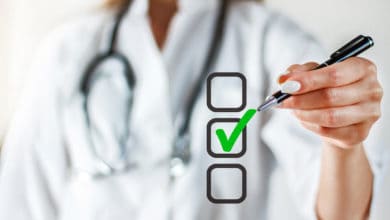Payvand Kamrani explains how you can succeed on medical clerkships be being on time, being mentally prepared, and being physically prepared.
A wise attending physician once told me that I had two jobs as a third-year medical student: 1. Be on time and 2. Be prepared. Seems simple enough, right? I could do that. However, my mind wondered, as most of us medical students do, into what really was his expectations of “preparedness.” How prepared? Prepared for what? It was my first day of this rotation and I already felt behind.
This feeling, of self-doubt, fear and unclear expectations seems all too familiar to most starting third-year medical students. We have been preparing for this moment. Ready to quickly interact with patients and begin learning in a clinical setting. We knew the medicine, well, some of the medicine. But being a third-year medical student is a lot more than just that. It’s a balance of being helpful but not annoying, engaging but not distracting, and most importantly, learning what field of medicine you are best suited for. I’ve broken down these simple steps that will allow you to start your third-year clerkship strong and already ahead of your peers.
Be on Time
Ever heard the saying “If you are on time, then you are already late.” Well, it’s true. As a medical student, you’ll likely get a schedule of educational lectures, meetings, and conferences. Don’t show up at the time the meeting is starting. Nothing is worse than all the attending and residents ready to start and you walk in last. I would always pretend to myself that the meeting would start 15 minutes before the start time provided to me. A 9AM meeting? I would put in my calendar 8:45AM. The same goes for clinic hours. If your attending begins seeing patients at 9AM, I would plan to arrive at clinic around 8:30AM.
Be Physically Prepared
Every day on rotation is different. Depending on the rotation, you may in the office, in the hospital, or a combination of both. You may be driving to multiple different sites throughout the week. Part of being a good medical student is being prepared for what could be thrown to you that day.
My tip – have an extra set of everything in your car. Put a duffle bag in your trunk and inside place an extra pair for scrubs (AND SNEAKERS) and an extra set of business casual attire. Several students get caught on their surgery rotation dressed in scrubs expecting a day in the OR and are embarrassed to realize they are to head to clinic in the afternoon with the attending. Having an extra set of clothes prevents you from being that medical student that had to go home and change. Other helpful things to keep in this duffle bag – phone charger battery, lint roller, and snacks. You never know if that day is going to be a long 12+ hour day and knowing if your phone died or your stomach starts growling, you could run out to your car and get what you need.
As for your white coat, what you carry diminishes greatly over time. However, there are a few things every medical student continues to bring to rotation:
- Small, pocket-sized notebook
- ALL THE PENS (attending, residents, and other medical students will ask to “borrow” one)
- Stethoscope
- Snacks
- Rotation specific items – depending on your rotation (surgery, peds) you may be required to carry additional items. It could be a good idea to ask the attending or resident you are working with what would be helpful for you to always have on hand.
Be Mentally Prepared
This part is actually very simple. When you go home, review the disease, treatments, and medications you saw that day. Explore any difficult concepts you couldn’t follow or understand and formulate some questions for your attending the next day. Doing this will not only reinforce what you’ve learned that day but will also remove that long awkward pause when the attending asks you “so, do you have any questions?”
By following this simple pieces of advice, you will be setting yourself up for success and can impress the attendings and residents you work with.



